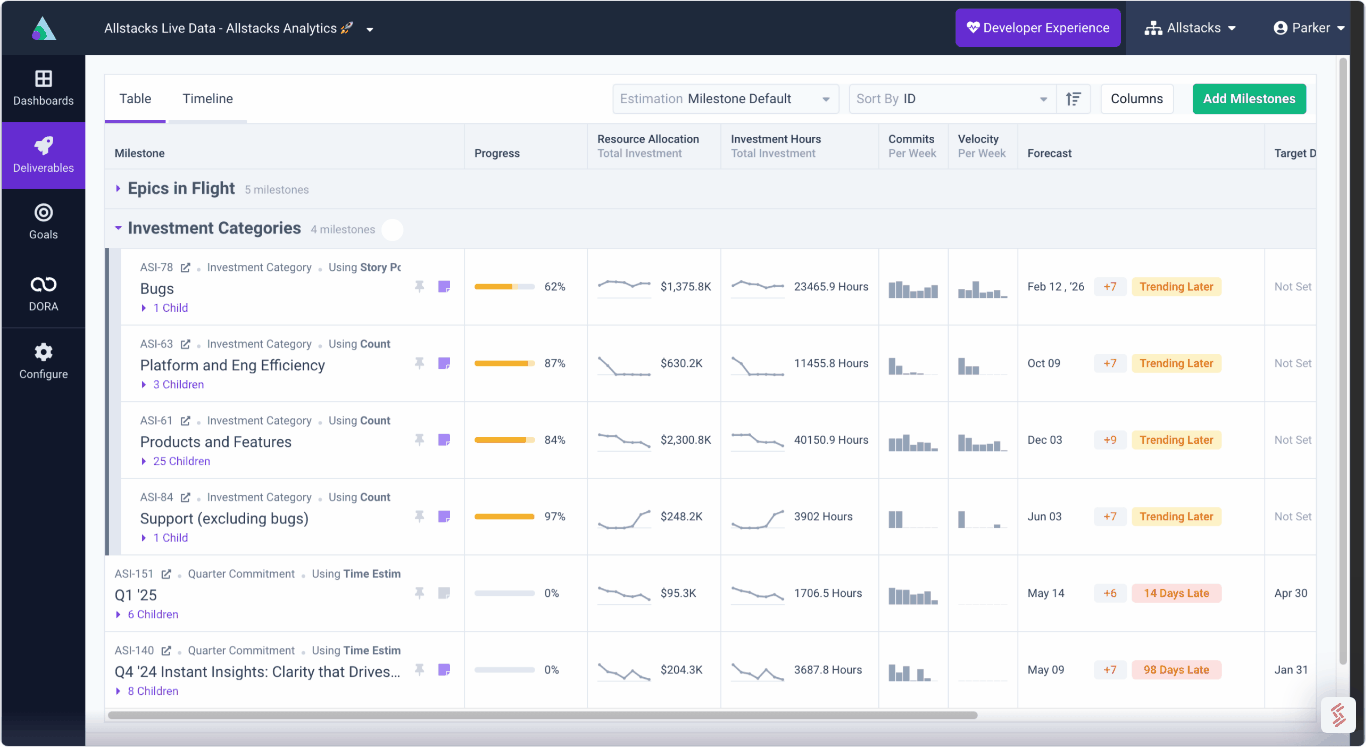.png)
Software Engineering Intelligence
-
Intelligence Engine
On-demand exhaustive AI-analysis
-
Engineering Investment
Complete visibility into time & dollars spent
-
360º Insights
Create meaningful reports and dashboards
-
Project Forecasting
Track and forecast all deliverables
DevEx
-
Developer Surveys
Create and share developer surveys
Software Capitalization
-
R&D Capitalization Reporting
Align and track development costs
Leading Through Data: The New Engineering Management Playbook for 2025
I've been noticing something interesting in our customers' job postings over the past couple of years. Engineering manager and VP roles increasingly list "ownership of engineering data and performance metrics" as a core requirement—not just a nice-to-have skill, but a fundamental responsibility.This shift reflects a broader transformation in engineering leadership that's been building momentum and is now reaching critical mass in 2025.

The Great Shift: From Intuition to Intelligence
The engineering leadership landscape has evolved significantly. A few years ago, engineering teams were skeptical of productivity metrics. The concern was understandable: would data be weaponized? Would it reduce the art of software development to oversimplified numbers?
Today, the conversation has matured. Engineering teams still need to ship secure, valuable code quickly—that hasn't changed. What has changed is our understanding of how to use data as a tool for empowerment rather than surveillance. Teams are discovering that thoughtful engineering metrics help them lead more effectively, identify bottlenecks faster, and make better decisions.
According to research from Harness on SPACE metrics, engineering organizations are moving beyond single-metric thinking to embrace multi-dimensional frameworks that balance velocity with quality, satisfaction, and well-being. This holistic approach marks a fundamental shift in how we think about engineering effectiveness and developer productivity.
The predictions for 2025 are clear: AI development agents are moving from experiments to essential tools. According to Deloitte's latest predictions, 25% of enterprises using GenAI will deploy AI agents in 2025, growing to 50% by 2027. Atlassian leaders predict that "2025 will be the year of the AI agent," with agents becoming increasingly sophisticated in how they collaborate with development teams.
These aren't just general-purpose AI assistants—we're talking about specialized AI coding tools that can handle everything from code generation and testing to documentation and deployment tasks across the software development lifecycle. This shift towards AI-assisted development is reshaping the developer workflow and improving code maintainability.
GitHub's research found that developers using AI code assistants complete specific tasks significantly faster. While the controlled nature of these studies means we should be cautious about extrapolating too broadly, it's clear that AI agents are becoming valuable members of engineering teams—but they need to get better at understanding and participating in the entire SDLC.
With AI development agents joining our teams, engineering management is evolving in fundamental ways. As NVIDIA experts predict for 2025, "AI agents will take every form based on each firm's needs," from code assistants to testing bots to documentation generators. This diversity requires sophisticated measurement approaches, including an AI measurement framework to evaluate the impact of these tools on engineering efficiency.
Leading organizations are pioneering new approaches to engineering measurement. Allstacks' industry benchmarks show how teams are using metrics like cycle time, coding days, and planned vs. unplanned work to understand their performance in context. These engineering metrics provide valuable insights into developer productivity and overall engineering effectiveness.
The Path Forward: Practical Steps for 2025
1. Build Data Fluency Now
The trend toward data-driven engineering leadership will only accelerate. Start building strong data practices today that will translate seamlessly to managing AI-native teams tomorrow. This foundation will serve you well regardless of how quickly AI agents mature.
2. Prepare Your Measurement Infrastructure
McKinsey's AI workplace report shows organizations rapidly adopting AI agents for complex tasks. Build measurement systems now that can accommodate both human and AI contributors, focusing on developer time savings and the impact of AI tool adoption on engineering efficiency.
3. Focus on Holistic Platforms
You need a comprehensive data platform that connects engineering work to business outcomes. Look for solutions that provide visibility across your entire delivery system and can scale as your team composition evolves. These platforms should incorporate prompt engineering strategies and context engineering techniques to maximize the effectiveness of AI-assisted development.
4. Foster a Data-Positive Culture
Make metrics transparency and data-driven discussions part of your team's DNA. When data is used for improvement rather than judgment, teams embrace it as a tool for growth. Regularly conduct developer experience surveys to gather feedback and ensure that AI coding tools are enhancing, not hindering, the developer experience.
The Bottom Line
The shift to data-driven engineering leadership represents a fundamental evolution in how we build and deliver software. As Forrester predicts, "Fifty percent of enterprises will abandon individual best-of-breed tools for DevOps platforms" in 2025. This consolidation reflects the need for unified visibility across increasingly complex delivery systems.
The engineering leaders who succeed in 2025 and beyond will be those who master the art of data-driven leadership—not as a way to micromanage, but as a means to empower teams, optimize hybrid human-AI collaboration, and deliver exceptional results. They will need to understand the nuances of prompt engineering and context strategies to effectively leverage AI in their development processes.
The future is arriving quickly. The question isn't whether to embrace data-driven leadership—it's how fast you can make it your competitive advantage. By focusing on engineering metrics, developer productivity, and the seamless integration of AI-assisted development tools, you can create a more efficient and satisfying developer workflow.
Ready to lead your engineering team with the insights that matter? Discover how Allstacks connects engineering data to business outcomes →


.png)